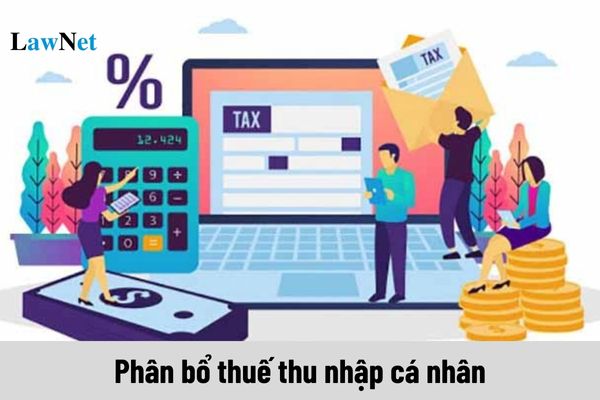What are cases of distribution of personal income tax in Vietnam?
What are cases of distribution of personal income tax in Vietnam?
Pursuant to Clause 1, Article 19 of Circular 80/2021/TT-BTC, personal income tax is distributed in the following two cases:
- Deduction of personal income tax for income from salaries and wages paid at the head office for employees working at dependent units or business locations in other provinces.
- Deduction of personal income tax for income from lottery winnings of individuals winning electronic lottery tickets.

What are cases of distribution of personal income tax in Vietnam? (Image from the Internet)
How many of methods of personal income tax distribution are there in Vietnam?
Pursuant to Clause 2, Article 19 of Circular 80/2021/TT-BTC, there are two methods of personal income tax distribution, specifically:
- For income from salaries and wages:
Taxpayers determine separately the personal income tax to be distributed for income from salaries and wages of individuals working in each province according to the actual tax deducted for each individual.
In the case of employee transfers, rotations, or secondments, based on the time of income payment, the personal income tax deducted is distributed to the province where the employee is working at that time.
- For income from lottery winnings of individuals winning electronic lottery tickets:
Taxpayers determine separately the personal income tax payable for income from lottery winnings of individuals winning electronic lottery tickets in each province where the individual registers to participate in the lottery through phone or internet distribution methods and where the electronic lottery tickets are issued through terminal device distribution methods according to the actual tax deducted for each individual.
Who are personal income taxpayers in Vietnam?
Pursuant to Article 1 of Circular 111/2013/TT-BTC as amended by Article 2 of Circular 119/2014/TT-BTC, the provisions are as follows:
Taxpayer
Taxpayers are resident and non-resident individuals as provided in Article 2 of the Personal Income Tax Law, Article 2 of Decree No. 65/2013/ND-CP dated June 27, 2013, of the Government of Vietnam detailing a number of articles of the Personal Income Tax Law and the Law amending and supplementing certain articles of the Personal Income Tax Law (hereinafter referred to as Decree No. 65/2013/ND-CP), who have taxable income as prescribed in Article 3 of the Personal Income Tax Law and Article 3 of Decree No. 65/2013/ND-CP.
The scope of determining taxable income of taxpayers is as follows:
For resident individuals, taxable income is income arising both inside and outside Vietnam, regardless of where the income is paid;
For individuals who are citizens of a country or territory that has signed an agreement with Vietnam on avoiding double taxation and preventing tax evasion with respect to taxes on income and are resident individuals in Vietnam, the personal income tax obligation is calculated from the month of entry into Vietnam in the case of the individual's first-time presence in Vietnam until the month the labor contract terminates and the individual leaves Vietnam (calculated for a full month). These individuals do not have to carry out consular certification procedures to implement the non-double taxation under the treaty between the two countries.
For non-resident individuals, taxable income is income arising in Vietnam, regardless of where the income is paid and received.
Thus, individuals required to pay personal income tax are resident and non-resident individuals with taxable income arising both inside and outside Vietnam as stipulated. Wherein:
- A resident individual is someone who meets one of the following conditions:
(1) Being present in Vietnam for 183 days or more within a calendar year or within 12 consecutive months from the first arrival date in Vietnam, where the arrival and departure day counts as 01 day.
(2) Having a regular place of residence in Vietnam in either of the following cases:
+ Having a regular place of residence as per the law on residence;
+ Renting a house to live in Vietnam according to the law on housing with lease contracts lasting 183 days or more during the tax year;
In the case that an individual has a regular place of residence in Vietnam according to the above regulation but is actually present in Vietnam for fewer than 183 days in the tax year and cannot prove residency in any other country, that individual is considered a resident in Vietnam.
Proving residency of another country is based on the Certificate of Residency. If the individual belongs to a country or territory that has signed a tax agreement with Vietnam without the provision for issuing a Certificate of Residency, the individual should provide a copy of their Passport to prove residency duration.
- A non-resident individual is someone who does not meet the above conditions.

